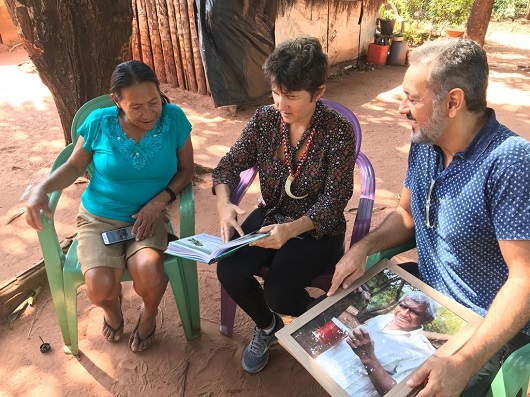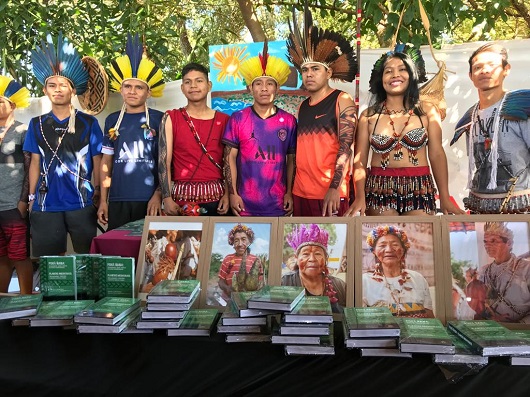Project studies the use of medicinal plants by the Guarani and Kaiowá against tuberculosis
10/04/2023
Solange Argenta (Fiocruz Pernambuco)
The construction of a large research collection in the Guarani language, the phytochemical analysis of medicinal plants, and the installation of a therapeutic garden and different educational products for the Guarani and Kaiowá people in Mato Grosso do Sul will be able to turn into a reality through a study coordinated by researchers Islândia Carvalho, from Fiocruz Pernambuco, and Paulo Basta, from the Sérgio Arouca National School of Public Health (Ensp/Fiocruz). Indigenous scholars and researchers from Fiocruz and the Federal University of Pernambuco (UFPE) are part of the project, which will expand the knowledge about the effects of medicinal plants used to treat tuberculosis by the Guarani and Kaiowá ethnic groups.
Indigenous scholars and researchers are working on building a large collection of research in the Guarani language (photo: Fiocruz Pernambuco)
“The situation of the Guarani and Kaiowá people in the Southern Cone is a portrait of what is happening to indigenous peoples in Brazil, tuberculosis is a challenge because hunger and malnutrition are also present. The perspective of this project is that we can build spaces in the village that would allow new subsistence strategies, since we will start exchanging knowledge with them and specialists in agroecology”, explains the coordinator.
At the Immunology Department of Fiocruz Pernambuco, the extracts used in auxiliary therapies or in the treatment of pulmonary tuberculosis will have their pharmacological potential tested, under the coordination of researcher Lilian Montenegro. UFPE Researchers Rene Duarte and Rafael Ximenes will also deepen the phytochemical and ethnopharmacological studies started in the previous project, which was also approved in the Inova Saúde Indígena RFP, which resulted in the creation of the Pohã Ñana Collection (in Portuguese).
This basis of knowledge will provide subsidies for the implementation of a Therapeutic Garden in the Amambai Village, located in Mato Grosso do Sul, both for study purposes and for the use of herbs by the indigenous people. The action will be coordinated by the Group of Indigenous Guarani and Kaiowá Youths (Jiga), researchers of this project, who will also complement the information on medicinal, food, and condiment plants available for cultivation in the village.
The research starts from the concept of intermedicality, through which health interventions take into account the cultural beliefs and therapeutic practices of indigenous peoples, respecting traditions and customs when adopting biomedical treatments in indigenous communities. With this perspective, the expectation is to obtain the safe use of these herbal medicines in association with allopathic medicines.
The book Pohã Ñana is one of the few works available in the literature that presents knowledge about traditional healing practices and a catalog with 82 medicinal plants used by the Guarani and Kaiowá people (photo: Fiocruz Pernambuco)
The research team has already received feedback from young students and indigenous researchers stating that the book Pohã Ñana has been an important reference for their academic studies. The book is one of the few works available in the literature, with free and open access, which presents knowledge about traditional healing practices and a catalog with 82 medicinal plants used by the Guarani and Kaiowá people in a systematic way and bilingual content. In view of this context and the large collection of data collected over the years of contact with holders of traditional knowledge in the communities, it has been noticed the importance and power of creating and managing a database open to Guarani and Kaiowá researchers for future research.
Audio of interviews with shamans, videos of focus groups made in the villages, technical research reports, images, and testimonials, among other materials, obtained since 2014 in a research carried out in this territory, will be systematized and analyzed together with indigenous researchers, which will allow the expansion of the production of content such as short videos, booklets, and e-books. All of this material can contribute to sensitizing indigenous health agents and professionals who work in primary care with the provision of services in SasiSUS, the subsystem of the Brazilian Health System (SUS) focused on Indigenous Health Care.
“The creation of this research database will allow new indigenous researchers to have access to the data collected in the last nine years, which is an important fact for new research, in addition to providing more efficiency in the application of resources”, concludes Islândia.


